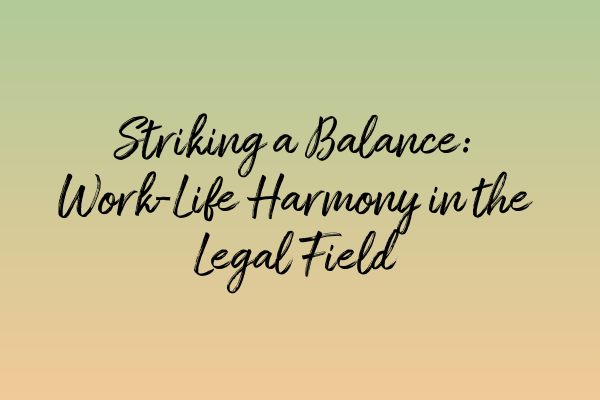Striking a Balance: Work-Life Harmony in the Legal Field
As a legal professional, you are well aware of the demands and pressures that come with practicing law. Long hours, high-stakes cases, and client expectations can often consume your life, leaving little time for personal pursuits and maintaining a healthy work-life balance.
However, it is essential to prioritize work-life harmony to ensure your well-being, mental health, and overall satisfaction in your career. In this blog post, we will explore strategies and tips to help you strike a balance between your professional responsibilities and personal life.
The Importance of Work-Life Harmony
Work-life harmony refers to the ability to juggle professional commitments while also finding time for personal interests, relationships, and self-care. Achieving this harmony is crucial for several reasons:
- Improved Mental Health: Constantly being immersed in work can take a toll on your mental well-being. By carving out time for relaxation and recreation, you can reduce stress levels and improve your overall mental health.
- Increased Productivity: Striking a balance between work and personal life allows you to recharge and rejuvenate. This, in turn, enhances your productivity and efficiency when you’re in the office.
- Stronger Relationships: Neglecting personal relationships can strain your connections with loved ones. Prioritizing quality time with family and friends strengthens your support system and brings joy to your life.
- Long-Term Career Satisfaction: Burnout is a real risk in the legal field. By maintaining a healthy work-life balance, you can prevent burnout and sustain long-term career satisfaction.
Tips for Achieving Work-Life Balance
Now that we understand the importance of work-life harmony, let’s explore some practical tips to help you achieve that balance:
1. Establish Boundaries
Set clear boundaries between your work and personal life. Communicate your availability to clients and colleagues, and resist the temptation to blur the lines. Designate specific times for work and leisure activities to ensure you have dedicated time for both.
2. Prioritize Self-Care
Make self-care a non-negotiable part of your routine. Take breaks during the workday, engage in activities that bring you joy, and prioritize your physical and mental health. Remember, you can only give your best when you are at your best.
3. Delegate and Outsource
Learn to delegate tasks that don’t require your direct involvement or expertise. Consider working with a virtual assistant or outsourcing administrative work to free up your time for more important matters.
4. Embrace Technology
Take advantage of technology to simplify and streamline your work processes. Use practice management software, online document storage systems, and collaboration tools to enhance efficiency and reduce time-consuming tasks.
5. Manage Your Priorities
Identify your priorities and focus on what truly matters. Learn to say no to additional responsibilities that don’t align with your goals or values. Prioritize your work tasks and allocate time for personal commitments without guilt.
6. Seek Support
Don’t hesitate to lean on your support system. Reach out to colleagues, friends, or mentors who can offer guidance and support during challenging times. Having a strong network can make a significant difference in maintaining a healthy work-life balance.
7. Practice Mindfulness
Cultivate mindfulness practices such as meditation, deep breathing exercises, or journaling to stay present and focused. These practices can help reduce stress, enhance self-awareness, and improve overall well-being.
Conclusion
Striking a balance between work and personal life is an ongoing process that requires conscious effort and prioritization. By implementing the tips and strategies discussed in this blog post, you can achieve work-life harmony and experience greater satisfaction and fulfillment in both your professional and personal endeavors.
For more information on related legal topics and areas of practice, we invite you to read the following articles:
- Private Prosecutions: Exploring Non-Governmental Prosecutions in Criminal Cases
- Rights of the Accused: Protecting Individual Liberties in Criminal Proceedings
- Magistrates’ Court vs Crown Court: Understanding Key Differences
- Protecting Vulnerable Witnesses in Criminal Trials: Best Practices and Legal Safeguards
- Unraveling the Complexities of UK Bail Laws


Leave a Reply